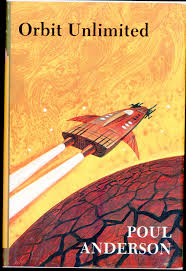Orbit Unlimited.
The Constitutionalists have colonized the High America plateau on Rustum. From its sides, they look down onto clouds, a long way down. Young Danny Coffin fantasizes about what lies beyond the clouds. His father, Joshua, thinks it self-evident that such imaginings should be discouraged. He expects the Constitutionalist, Svoboda, to agree that fantasies are not truthful. They are not but nor are they presented as truthful.
Can there be intelligent beings whose libraries and bookshops contain only history and science but no fiction or myth? Such beings would not be human. But could they exist? Every assertion entails many negations. That the sky is blue entails that it is not red, green etc. But negations generate questions: Why is the sky not green? What if it were? Scientific theories require hypothesis and imagination. To speak only about what is, and what is visible and tangible, would not be to deal with the real world, most of which is unobserved and unknown. We need to hypothesize about what is beyond the clouds as a first step to finding out. And early stories and myths need to be valued and preserved as where we have come from.
We would not be human without imagination and would not be who we are without the gods and all the characters of literature and fiction. Sherlock Holmes was around longer than anyone now alive.

5 comments:
To date we have only human beings as examples of an intelligent species, and it's very hard to extrapolate to any purpose from a sample of one.
Eg., look at the wildly varied types of solar system we've found since we developed systems sensitive enough to tell us about expolanets.
Nobody anticipated that most stars would have planets, or that their arrangement and size could differ so wildly from our solar system, or that 1 in 5 Sol-type suns would have earth-like planets in the liquid-water zone, or that red dwarfs could have planets... and I could go on and on.
The Webb telescope will undoubtedly bring lots of bizarre new data.
Hopefully including technological civilizations near us.
Even better, such civilizations free of war.
Kaor, Mr. Stirling and Paul!
Mr. Stirling: I'm very keen to know what the Webb telescope might reveal!
Paul: And * I * would not be surprised to find out, if other intelligent races exist, that they too are troubled with conflicts and wars.
Ad astra! Sean
Sean,
Of course they might be troubled by wars but we don't know. A high tech civilization that has existed for a long time must either have resolved any internal conflicts that it has had or have destroyed itself, i.e., not have existed for a long time.
Paul.
Kaor, Paul!
Or, just as likely, found means of limiting conflicts so that they don't cause too much damage. E.g., "cabinet wars" instead of desperate life and death struggles.
Ad astra! Sean
Post a Comment